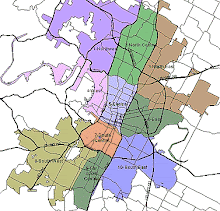
One of the real challenges in Austin is probably going to be coffeeshop culture. Now while it's true that McDonald's is starting to have some lattes and mochas that other coffee shops offer, the real challenge is how the independent coffee shops do business. One huge issue with coffee shops especially in a city like Austin is the number of students and workers who come in to coffee shops to do work. While it's important that coffee shops cater to everybody, the real challenge is going to be making sure that coffee shops can stay in business while workers come into them, and do homework for hours at a time. Many different independent coffee shops have had problems with this in the past, or at least the ones I've seen, when people don't order that many items from the menu, but they stay in the coffeeshop for hours at a time. That is helpful insomuch as there are people inside the coffeeshop, but it's a bad aspect for the coffeeshop business because there aren't enough people who can sit in a coffee shop which is being taken up with students with laptops doing homework. Some students need to be around other students to focus and study. However, if someone needs to be around other people to do his or her work that person needs to go place where there isn't a business that's expected to be run and where other people are sitting.
My solution is this: there need to be some larger coffee shops that have space specifically for students, but they need to disallow the rest of the space to be used for people who take up space with laptops. For example, if a student comes in and sits for half an hour to 45 minutes, that's not the worst thing in the world. Even regular patrons will probably sit for 30 to 45 minutes because we have such a strong coffee culture. The real challenge is when the student sits there for hours. A good tactic in that case would be for the manager to say after about an hour, especially if the coffeeshop is filled up, "Please move to the student section of the coffeeshop. We need the space for other customers, and there are too many people in here for you to sit here and not order anything for an extended period of time." Some people may say that this is fascist, largely because they fail to recognize that a table that only makes $12 because of three students for six hours can be the real death of a business. I guess that's one thing that McDonald's can do for us: they can offer a space where the business doesn't suffer just because students are sitting with WiFi and not order anything new.

2 comments:
Students and business people are a challange for bookstores and coffee shops. But creating even more space for non-paying customers is not the ideal solution as the establishment still pays rent on the space - which is their biggest overhead.
Other cities are creating coffee shops inside their public and college libraries. They build a glass enclosure for sound proofing and make an environment that students and modern day patrons want to go to. It brings people back to the library and is also a great money maker for the library.
I think the biggest challenge is that we don't have enough public spaces for people that also provide business opportunities. Therefore, coffee shops are fulfilling two roles: 1) business opportunities and 2)community builders. In a perfect world, both of those traits would be considered the same, but in a city that is still "cheap," communities and businesses are on difficult terms.
The other option is to provide a space that focuses multiple businesses in one location, and make the location a "destination" spot. The real problem in Austin is that because people are so anti-density the farther one moves away from central Austin, businesses have to work twice as hard. Especially when gas is high, it is difficult to get people out of their cars and spend extra money at a business when there are no other advantages to being at the business. Bringing extra work is almost required for the car trip to make economic sense to the general population.
Post a Comment